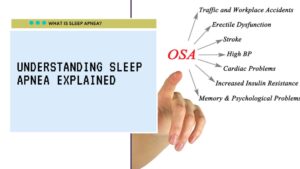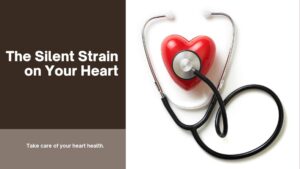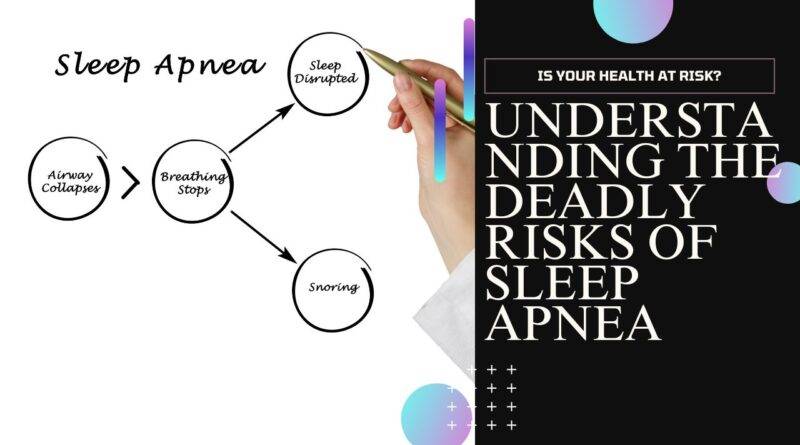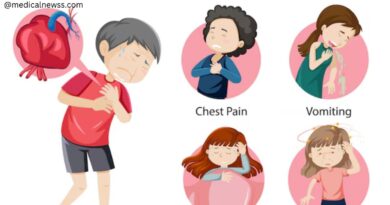Can Sleep Apnea Kill You Dangers
Introduction
Sleep apnea is a serious disorder where your breathing constantly stops and then restarts during sleep. Left untreated, it may cause severe health complications and even death. Let’s see the risks of sleep apnea; let’s know how it affects your body; and let’s find out why early detection and treatment are important.
What is Sleep Apnea?

Breathing pauses during sleep are a defining feature of sleep apnea. The word “apneas” describes interruptions that last from a few seconds to several minutes. Typically, obstructive and central sleep apnea are the two types of this illness. OSA occurs when the muscles in the throat relax too much, whereas CSA occurs due to an abnormal signal from the brain to the muscles controlling the breath.
Three Key Points:
- no interference with breath during sleep.
- Primary Varieties: Obstructive and Central.
- can be diagnosed by sleep tests.
Is sleep apnea lethal?
Yes, if left untreated, sleep apnea can be deadly. The condition increases one’s susceptibility to sudden cardiac arrest, heart attack, stroke, and hypertension. The condition places tremendous pressure on the heart at night when oxygen levels are at their lowest. It can induce critical cardiovascular complications in the long run. Can Cane Sugar Increase the Risk of Lethal Sleep Apnea? What Is the Surprising Link?
Three Key Points:
- often increases the risk of heart-related health problems.
- Exacerbates sleep apnea, a condition wherein low oxygen levels in the blood are built up while asleep.
- means being treated for it might lead to sudden death.
The Silent Strain on Your Heart

Sleep apnea exerts heavy pressure on your heart. When you stop breathing, the oxygen level of your blood goes down and forces your heart to work harder. Long-term strain can eventually cause heart disease, arrhythmias, and even heart failure. Most victims of sleep apnea also suffer from high blood pressure, thus making it a very dangerous condition.
Three Key Points:
Increases heart rate during sleep.
Causes heart disease.
Causes high blood pressure.
Stroke: A Serious Outcome
A common root of untreated apnea is an augmented stroke risk. Unconscious sleep-related mishaps in blood flow due to the inadequate oxygen will cause lifelong disability or death among people suffering from sleep apnea.
Three Important Facts:
- Brain damage is caused by low levels of oxygen.
- Increased risk of stroke.
- Causes lifelong disability.
Hypertension and Sleep Apnea

High blood pressure, or hypertension, can be brought on by or made worse by sleep apnea. With each drop in oxygen, the body raises its blood pressure to make up for it. In time, this steady increase in blood pressure becomes chronic in nature, paving the way for heart attacks and kidney diseases, among many others.
Three Important Facts:
- increases the chances of long-term hypertension.
- Hypertension results from a deficiency in oxygen.
- Causes long-term cardiovascular complications.
Mental health effects
Sleep apnea affects your body’s physical health but also erodes your mental calmness. The unrestful sleep and discomfort affect your moods, and you become irritable, depressed, and anxious. In extreme cases, if such a sleep apnea condition is left untreated, it may lead to a decline in cognitive function, memory, and concentration.
Three Important Points:
- Causes mood swings and irritability.
- Increases the chances of depression and anxiety.
- Impacts cognitive function and memory.
Fatigue and Daytime Sleepiness

One of the most obvious manifestations of sleep apnea is intense daytime somnolence. People with sleep apnea typically wake up feeling groggy, even if they sleep for hours. This chronic fatigue could impair daily functioning, decrease productivity in the workplace, and might be a factor in accidents, particularly in driving.
Three Key Takeaways
- Causes chronic daytime fatigue.
- Decreases concentration and performance.
- Increases risk for accidents, such as car wrecks.
Sleep Apnea and Obesity: A Vicious Cycle
There is a very close association with sleep apnea and obesity. Obesity is the number-one cause of airway obstruction causing sleep apnea. The sleep apnea can then contribute to weight gain through disrupted metabolism and increased hunger hormones, creating a cycle.
Three Key Points:
- Obesity Increases the Risk for Sleep Apnea
- Sleep Apnea Disrupts Metabolism
- It is true that weight gain and the progression of other symptoms are directly proportional.
Effects of Sleep Apnea on Relationships
Sleep apnea can also affect relationships, especially if you sleep with a partner. You snore loudly and wake up frequently, disturbing the sleep of your bedfellow, which can result in frustration and resentment. If not treated, it can also cause moody behavior and irritability that may prove quite stressful to emotional bonds.
Three Key Points:
- Causes loud snoring that is disturbing to partners.
- Could lead to frustration in relationships.
- Mood swings affect emotional bonds.
Importance of Early Treatment
Sleep apnea is curable, though early diagnosis is the way to go. Lifestyle changes can be as simple as losing weight or quitting smoking. Sometimes, continuous positive airway pressure, or CPAP, machines will keep your airways open so you can breathe at night. Treating sleep apnea may greatly improve your quality of life, reduce health risks, and eliminate potentially fatal complications.
Three Key Points:
- Early diagnosis and treatment are essential.
- CPAP machines will control the symptoms.
- Treating sleep apnea is treating your whole health.
Diabetes and Sleep Apnea: A Deadly Combination

Sleep apnea symptoms may foster a vicious cycle that leads to disturbances in the quality of sleep, followed by insulin resistance, hence a failure by the body to keep the glucose content of the blood at a normal level. This has a great chance of occurrence with type 2 diabetes and becomes very hard to manage in those suffering from this disease.
Key Points: Three
- Sleep apnea increases the chances of insulin resistance.
- Poor sleep causes high blood sugar levels.
- Compliance with diabetes management may be affected in those already suffering from the disease.
How Smoking and Alcohol Aggravate Sleep Apnea
Lifestyle habits, including smoking and alcohol intake, may also compound sleep apnea. Smoking leads to inflamed airways, relaxing the tissues at the back of the throat. Because alcohol relaxes the throat muscles and causes airway obstructions, it prolongs the time that breathing stops while you sleep. These lifestyle habits can be decreased and even shunned to improve sleep quality, reducing the risks linked with sleep apnea.
Three Key Points
- Smoking results in inflamed airways; the effects of this inflammation are worse apnea.
- Alcohol relaxes the muscular tissue at the back of the throat, leading to increased rates of blockage in the airways.
- There are so many ways quitting smoking and limiting alcohol can reduce symptoms.
Conclusion: Take Sleep Apnea Seriously
Sleep apnea is more than a snore problem; rather, it can be dangerous and affect your health to the core. It can lead to heart disease and strokes, to name a few, or potentially high blood pressure, mental issues, and many more life-threatening risks that can lurk silently. However, the good news is that sleep apnea is treatable, and if you or someone close suspects sleep apnea, then seek medical advice immediately. Treatment may save your life.
Key Takeaways
- Sleep apnea has the potential to bring about serious health complications, even death that may come abruptly.
- Some common risks include heart attacks, strokes, and hypertension.
- To avoid serious consequences, early action is essential.




